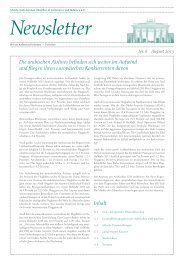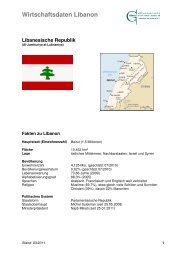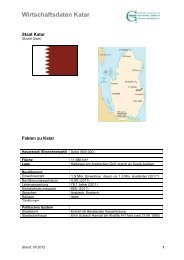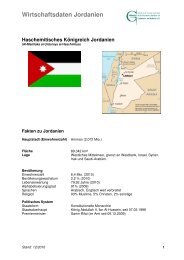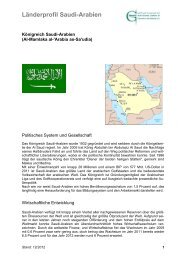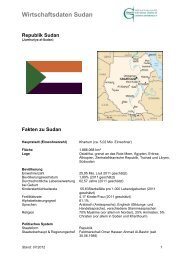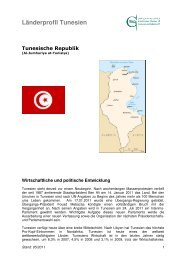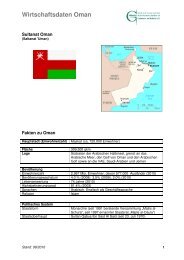Saudi-Arabien Wirtschaftshandbuch Saudi Arabia Business ... - Ghorfa
Saudi-Arabien Wirtschaftshandbuch Saudi Arabia Business ... - Ghorfa
Saudi-Arabien Wirtschaftshandbuch Saudi Arabia Business ... - Ghorfa
Sie wollen auch ein ePaper? Erhöhen Sie die Reichweite Ihrer Titel.
YUMPU macht aus Druck-PDFs automatisch weboptimierte ePaper, die Google liebt.
132<br />
–––––––––––––––––––––––––––––––<br />
PublIc order lAw<br />
Introduction<br />
Until the start of 2007, state procurement was primarily<br />
governed by two laws. Firstly by the laws defining the execution<br />
of state purchases and the performance of projects<br />
and work (Procurement of Government Purchases and<br />
Execution of its Projects and Works Regulation, Royal<br />
Decree No. M/14 dated 7/4/1397 H (27.3.1977)), and<br />
secondly in the Tenders and Auctions Regulations Royal<br />
Decree No. M/6 dated 24/2/1386 H (14.6.1966). These<br />
laws have now been replaced by the combined Government<br />
Tenders and Procurement Law, Royal decree No.<br />
M/58 dated 4/9/1427 H (27.09.2006) and its Implementation<br />
Regulations, Minister of Finance Decision<br />
No. 362 dated 20/2/1428 H (10.03.2007)). These regulations<br />
update the statutory framework. In particular,<br />
consulting and service agreements, and lease and usage<br />
rights agreements have been taken into consideration.<br />
The type of tendering and execution form is selected depending<br />
on the type of project, the performance specifications<br />
and the question of whether or not the public tender<br />
is actually public or closed. A foreign company can submit<br />
a tender for executing the project without actually being<br />
represented in <strong>Saudi</strong> <strong>Arabia</strong>. In this case, the foreign supplier<br />
may simply tender for delivery transactions, however<br />
he may also submit a tender to execute the project<br />
together with other companies, with <strong>Saudi</strong> partners as<br />
a foreign/<strong>Saudi</strong> consortium, as a partner in a company<br />
founded in <strong>Saudi</strong> <strong>Arabia</strong>, as a dependent branch office or<br />
simply as a sub-contractor of a <strong>Saudi</strong> company. The involvement<br />
of a so-called service agent, who purchases the<br />
tender documents and submits the tender for the foreign<br />
company, is no longer required.<br />
When negotiating the project, the specimen agreement for<br />
public purchasing as defined in Art. 29 of the law needs<br />
to be observed. This contract, the so-called Public Works<br />
Contract, is adapted to the respective project requirements<br />
by the tender authority during the tendering process.<br />
the pre-qualification<br />
To participate in most of the public tenders, both foreign<br />
and also domestic companies need to pre-qualify. The<br />
pre-qualification process is performed by the contracting<br />
public authority. There is no central registration authority<br />
in <strong>Saudi</strong> <strong>Arabia</strong>. Classifications are made by the<br />
classification department of the Ministry of Municipal<br />
and Rural Affairs in certain areas. The classification primarily<br />
relates to pure construction work, entertainment,<br />
maintenance and catering for public authorities. However<br />
this does not replace the pre-qualification for the individual<br />
tendering public authorities. It is becoming common<br />
practice for the pre-requisites for a pre-qualification<br />
to be published in English on the websites of the respective<br />
authorities although these may differ slightly from each<br />
other. Generally, various information is required for a<br />
pre-qualification procedure. This includes details about<br />
the contract performance area, the company structure,<br />
the general management and company articles, the experience<br />
of the company in international markets in general<br />
and in particular in the <strong>Saudi</strong> market if applicable. If any<br />
projects have already been executed in <strong>Saudi</strong> <strong>Arabia</strong>, a<br />
project list and appropriate attestation by the <strong>Saudi</strong> Tax<br />
Office (DZIT) should be enclosed confirming all paid<br />
taxes, a so-called Tax Clearance Certificate.<br />
Preference regulations<br />
The <strong>Saudi</strong> public contracting law contains some regulations<br />
that result in preferential treatment of local companies.<br />
Up until now, these are WTO-conform; however<br />
there is a WTO Agreement on Governmental Procurement<br />
within the WTO. This agreement, which has existed<br />
in its original form since 1981 and which was completely<br />
revised in 1996, has been signed by 28 states (of a total<br />
of 150 WTO member states). It aims to make public procurement<br />
more transparent and in particular to eradicate<br />
national preference decisions. On its entry to the WTO<br />
in December 2005, <strong>Saudi</strong> <strong>Arabia</strong> declared its willingness





